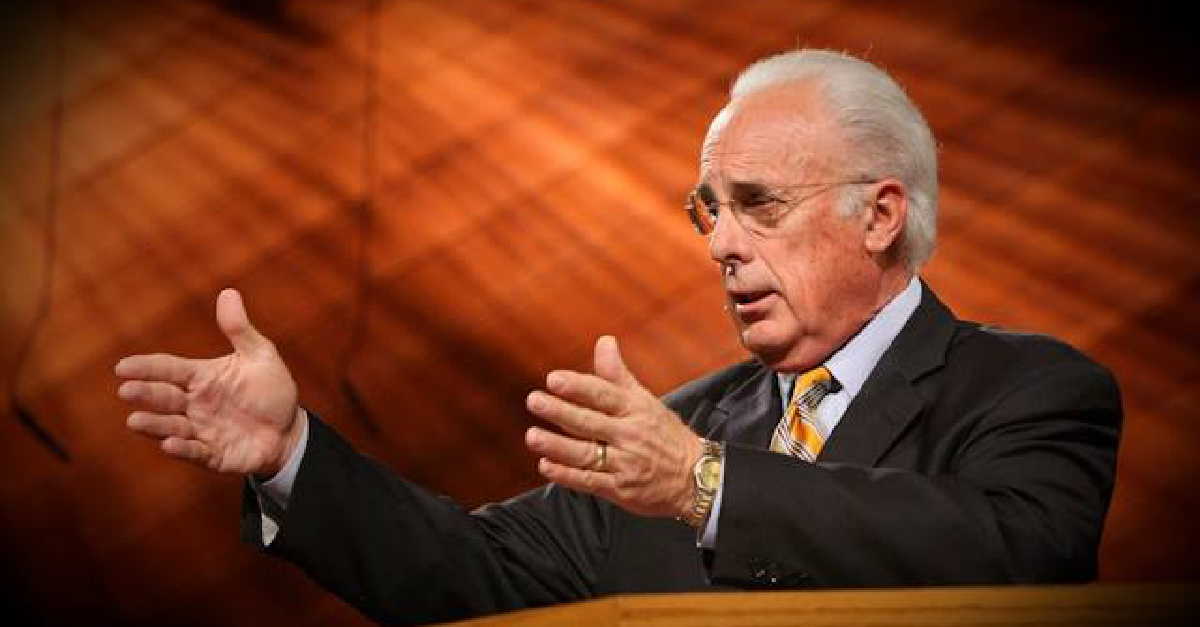
Pastor and author John MacArthur criticized the concept of Christian nationalism, telling his congregation the “responsibility of the church is not to advance the kingdom of this world.”
MacArthur also said elections are growing more confusing for Christians because a candidate who is “anti-abortion” may be “sinful and wicked in some other categories.”
The pastor of Grace Community Church and the host of the popular radio ministry Grace to You made the comments during a Q&A session at his congregation last week.
Asked to give his opinion on Christian nationalism, MacArthur began by answering, “The Kingdom of God is not of this world.”
“[Jesus] said, ‘My Kingdom is not of this world. If my Kingdom were of this world, my servants would fight.’ His Kingdom is not of this world. The kingdom of this world is a separate world. They’re not linked together. Let me say it another way: Nothing that happens in any nation, whether it’s a communist nation, a Muslim nation, or a quote-unquote quasi-Christian nation, or an atheistic nation, nothing in that nation — politically, socially — has anything to do with the advancement of the Kingdom of God. Because the Kingdom of God is separate from that system. God, in His sovereignty, is building His church, and the gates of Hades will not prevail against it, Jesus said.
“So the idea that you should link up some political effort, some political process, some social process, some gain of power or influence, in a culture as part of the advance of Christianity is alien to Christianity. You never have our Lord approaching anything like that, nor the apostles, and particularly the Apostle Paul. [Paul] sought to gain no favor with the Roman Empire, whatsoever, or for that matter with any other of the rulers that he ran into during his life.”
MacArthur said Christians should vote, although he said elections are not as black and white as they once were.
“We have to be the people who uphold righteousness. When we come to vote, we want to vote for that which is the most righteous option. Obviously, we can’t vote in righteousness, but we have to vote in a way that reflects our commitment to the righteousness of God. So we couldn’t possibly elect somebody who was an abortionist, somebody who was LGBTQ or LGBTQ-affirming, or any other deviation from God’s righteous moral standard. It gets harder, doesn’t it nowadays? Because even sometimes, when politicians are more conservative and anti-abortion, they may be sinful and wicked in some other categories. And it’s very hard to find out who is really honest and who is simply dishonest and seeking power.
“But in the end, we do what we can [in elections] with the understanding that the responsibility of the church is not to advance the kingdom of this world. That’s a faulty viewpoint.”
Christian nationalism, he added, is “usually tied to what is called post-millennialism.”
“And that is the view that the church — somehow by influencing the culture — can bring in the Kingdom of Christ. In other words, it’s the idea not that Christ returns and sets up His Kingdom, but that the church establishes His Kingdom and then hands it to Him. That is not what Scripture teaches. What Scripture teaches is what we’re learning from the book of Revelation: Things are going to get worse and worse and worse. And the end of human history is not the church triumphant, reining in the world and taking over the structures of human kingdoms. That’s not what happens. At the end of human history, the believers are persecuted and murdered. And that’s the very opposite of what Christian nationalism would anticipate. So we believe the Bible teaches that things get worse and worse, headed toward the wrath of God, which we’re seeing in Revelation. And then our Lord returns, Himself, to establish His Kingdom.”
Image Credit: John MacArthur Facebook
Michael Foust has covered the intersection of faith and news for 20 years. His stories have appeared in Baptist Press, Christianity Today, The Christian Post, the Leaf-Chronicle, the Toronto Star and the Knoxville News-Sentinel.